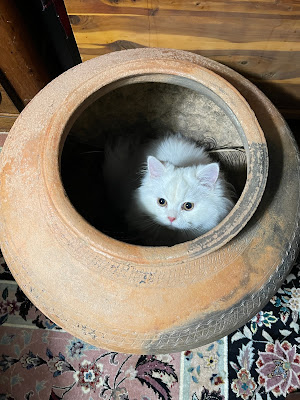There are questions here that need to be examined at the deepest levels of Being, which takes many years. I think the point of the discussion is that the concentration of Being is essential to preparing the cells for the receiving of The Sorrow. Only through this action can true humility and true compassion begin to grow in a person. These two faculties, which are metaphysical and psychic faculties, not ordinary human ones, are essential.
Because it's possible to write about these qualities and analyze them, we make the mistake from the beginning of thinking that they belong to us and are expressions of humanity. Yet they are expressions of humanity only to the extent that they are an exact reflection of God’s nature, and thus have a much higher quality than we understand in our day-to-day exchange with the world. If we truly understood them, they’d be held sacred in every way; and the fragment of true religion which is still alive in each church where people pray with sincerity, this is still done. Yet, as we know, wrong crystallization can fundamentally pervert even that holy action.
The Gurdjieff work, then, actually has a single aim from the perspective of where we are now. Casting all else aside — all the cosmology, all the prattling on about self remembering, about attention and consciousness, and so on —it is aimed at developing the sensation that assists in the concentration of Being, in order to prepare the molecular substrate for its spiritual work, so that it can receive particles of the Sorrow and begin to concentrate them.
This has the capacity to produce real love in human beings. But that is only done through receiving The Sorrow—we could easily call it The Essential Sorrow — of God’s Being. All of creation, in fact, is designed to undertake this work. Humanity has completely forgotten it. We only see vestiges of it that have been handed down from the ancient cultures where it was well understood; and one could easily argue that the entire 366,000 words in Beelzebub’s Tales to His Grandson are all aimed at conveying this, and not really much more.
Anyone who undertakes the Gurdjieff work without understanding these fundamental propositions about the concentration of Being and the purpose it serves has undertaken it more or less by accident—most likely for selfish reasons, and with selfish aims. I suppose that’s inevitable; after all, we all start out broken. But right crystallization in any being will inevitably produce this understanding over the long run, and I don't see any harm in explaining this, so to speak, "up front." I have seen so many deviations and profound misunderstandings in the Work that it seems it must be the time to state these things plainly.
Without a certain understanding, what I’m speaking of will be taken in the wrong way and, of course, argued about and turned on its head. Any objective understanding can be abused in this way by those in the grip of subjective identifications. Yet the absolute results of the Work, if it’s undertaken with sincerity and in a heart dedicated to the pursuit of real understandings, can only begin here at this point of a concentration of Being, and the meaningful way in which it serves the development and evolution of love and compassion throughout the universe. We’re vehicles for those forces; and in every way, in every action and in every life, to the extent that we fail to serve these forces and develop them responsibly for comprehensive and universal exercise within life itself, we fail the very reasons for our existence itself.
If this isn't a sobering proposition, there aren't any.
with warm regards,
Lee












